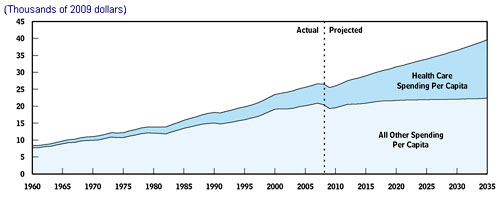Via Matt Yglesias, Adam Ozimek has a question:
Here is something I don’t understand about austerity now proponents: is cutting short term spending a second best alternative to fixing the long-term budget problem? Or does the optimal policy response include BOTH short-term spending cuts and a long-term budget fix? If the answer is the latter, then I want to know what problems aren’t solved by fixing the long-term budget problems that also require short term cuts?
I’m not in favor of short-term budget cuts, but just for the sake of conversation I thought I’d take a crack at providing the best answer I can think of to this. But then I clicked the link, and it turns out Ozimek already did it:
I think the best case against short term stimulus is to say that the government can’t be trusted to combine a serious long-term budget fix with a short term stimulus package. This means that no matter what they promise they will really pass a stimulus package without long-term cuts, which it will signal to the market that they are even more cowardly with respect to addressing the long-term problems than we first thought, and thus the fiscal position just got worse vis-a-vis politicians ability to handle it.
I’m more sympathetic to this argument than Ozimek himself is, but the real problem with it is simple: it assumes the austerity crowd is sincerely in favor of long-term budget cuts in the first place. They aren’t. They say they are, of course,  but the reality is that long-term cuts mean essentially one thing: cuts to Medicare. Conservatives don’t want to cut defense spending; they can’t cut interest payments; domestic discretionary cuts are too small to have much impact; and Social Security contributes only modestly to our long-term budget problems. It’s true that long-term cuts to domestic spending (if the promises could be made credible) and to Social Security would make a difference. They just wouldn’t make a big difference.
but the reality is that long-term cuts mean essentially one thing: cuts to Medicare. Conservatives don’t want to cut defense spending; they can’t cut interest payments; domestic discretionary cuts are too small to have much impact; and Social Security contributes only modestly to our long-term budget problems. It’s true that long-term cuts to domestic spending (if the promises could be made credible) and to Social Security would make a difference. They just wouldn’t make a big difference.
So Medicare it is. If you’re serious about long-term deficits being a threat to the country and you’re unwilling to raise taxes, then you have to support big-time cuts in Medicare. But the Republican Party just spent the past year loudly demonizing even the most modest cuts in Medicare as death panels and intergenerational treason. They plainly have no intention of tackling this.
So then: The austerity crowd doesn’t actually care about long-term deficits. What they care about is appealing to their tea party base and winning the November election. If the Republican leadership wants to prove me wrong by releasing a detailed plan for serious cuts in Medicare spending this summer, then I’ll happily eat some crow. I’m pretty sure that won’t be on the menu anytime soon, though.













